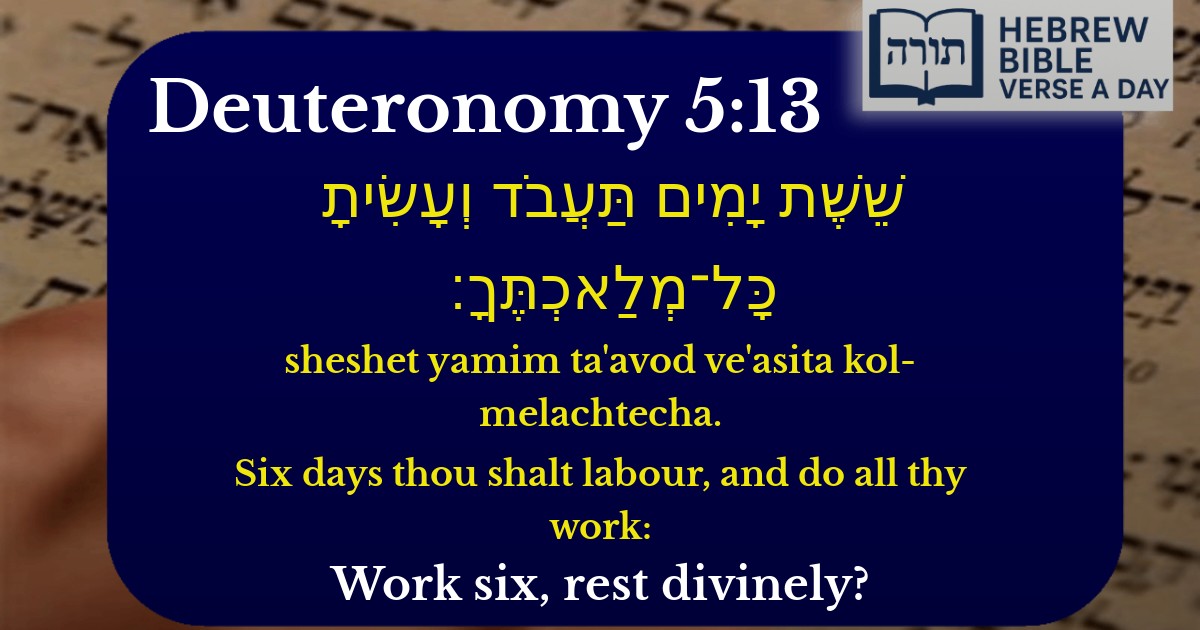Frequently Asked Questions
Q: What does 'Six days you shall work' mean in Deuteronomy 5:13?
A: This verse from the Ten Commandments teaches that we should engage in productive labor for six days of the week. According to Jewish tradition (as explained by Rashi and Rambam), this is both a commandment to work and a preparation for Shabbat - we must complete our work during the six days so we can properly rest on the seventh day.
Q: Why does the Torah command us to work for six days?
A: The Torah commands work for six days to establish a balance between physical labor and spiritual rest. As the Talmud (Avodah Zarah 3a) explains, just as G-d created the world in six days and rested on the seventh, we emulate this divine pattern. Work is considered holy when done with proper intention and within this framework.
Q: What counts as 'work' according to this verse?
A: While the verse mentions 'all your work,' Jewish law (based on Talmudic interpretation) defines 39 categories of prohibited labor on Shabbat. During the six workdays, these activities are permitted and encouraged. However, the Mishnah (Avot 1:10) teaches that our work should be honest and meaningful, not just physical labor but also Torah study and good deeds.
Q: How does this verse apply to modern work life?
A: This verse remains highly relevant today. The Rambam (Hilchot De'ot 5:1) teaches about maintaining balance - we should work sufficiently to support ourselves and our families during the six days, but not become obsessed with work. The Shulchan Aruch (Orach Chaim 306) also discusses proper work ethics during the six days to prepare properly for Shabbat.
Q: Does this mean we must work literally all six days?
A: No, the verse doesn't require working every single day. As Rashi explains, the commandment establishes a framework - six days are designated for work, but within that, individuals must find the right work-life balance. The Talmud (Moed Katan 11a) discusses that taking breaks when needed is permitted, as long as one maintains the six-day work structure in principle.


The Commandment to Work Six Days
The verse "שֵׁשֶׁת יָמִים תַּעֲבֹד וְעָשִׂיתָ כָּל־מְלַאכְתֶּךָ" (Six days you shall labor and do all your work) appears in Shemot (Exodus) 20:9 as part of the Ten Commandments. This directive establishes the obligation to engage in labor during the six days of the week, paralleling the commandment to rest on Shabbat.
Rashi's Explanation
Rashi (Exodus 20:9) emphasizes that the verse does not merely permit work but commands it. He explains that just as resting on Shabbat is a mitzvah, so too is working during the six days of the week. This framing ensures that labor is not merely a necessity but a sacred duty, elevating mundane work into divine service when performed with the proper intention.
Rambam's Perspective
Rambam (Hilchot Melachim 6:10) discusses the broader ethical and halachic implications of this verse. He teaches that a person must engage in productive labor to sustain themselves and avoid dependency on others. This aligns with the Talmudic principle (Kiddushin 29a) that a father must teach his son a trade, reinforcing the value of self-sufficiency and dignity in work.
Midrashic Insights
The Mechilta (a halachic Midrash on Shemot) connects this verse to the creation narrative, noting that just as Hashem worked for six days and rested on the seventh, human beings are instructed to emulate this divine model. This teaches that labor is not a punishment but a reflection of our partnership with Hashem in perfecting the world (tikkun olam).
Practical Halachic Considerations